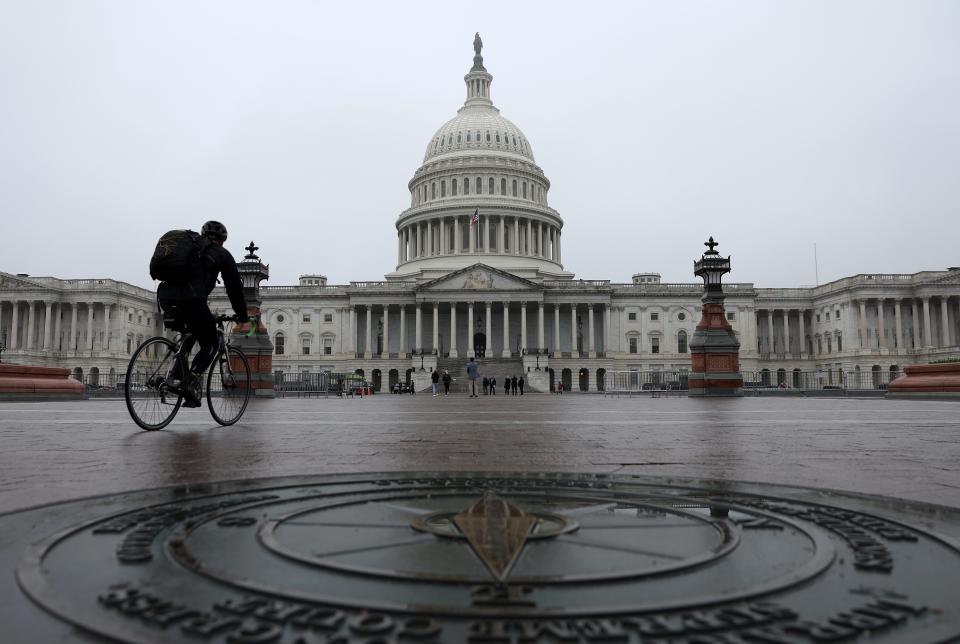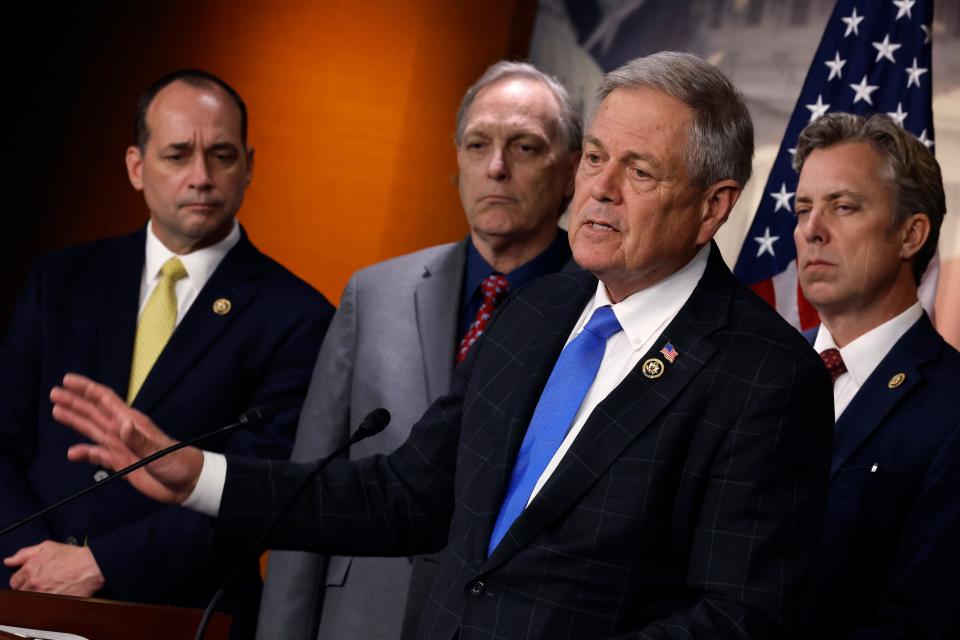House passes $460 billion government funding deal, temporarily dodging shutdown
WASHINGTON – The House passed the first six spending bills needed to fund the government on a long-term basis, signaling the beginning of the end of constant government shutdown scares on Capitol Hill.
The legislation easily cleared the lower chamber by a bipartisan vote of 339-85. In what has become a familiar sight for the House, far more Democrats than Republicans supported the bill, despite the GOP's majority in the lower chamber.
A chunk of House Republicans voted against the spending bill because it didn’t have many of the conservative policy wins some members wanted, such as stricter border polices.
While House Speaker Mike Johnson, R-La., and other GOP leaders sought to sell the victories they could get in the package, any final long-term spending bill ultimately would not have been able to satisfy conservatives. With a Democratic-controlled Senate, President Joe Biden in the White House and the GOP’s razor-thin majority in the House, Republicans never had much leverage to get everything they wanted.
“We want to cut spending, we want to limit the size and scope of the federal government. The reality right now is we have divided government,” Johnson said Wednesday morning.
The bill now heads to the Senate, where it is also expected to pass and later head to Biden’s desk for his signature.

What parts of the government does the bill fund?
Here's the background: Every year, Congress has to pass 12 individual spending bills to keep the government's doors open. But recently, lawmakers have failed to meet their spending deadlines, so they tend to package the dozen bills together into an enormous piece of legislation called an "omnibus. "
But the first six of those spending bills are set to expire on March 8, so to avoid a partial government shutdown, negotiators packaged the funding into one deal known as a "minibus."
The plan passed Wednesday will fund parts of the government related to:
Agriculture, Rural Development and the Food and Drug Administration
Commerce, Justice and Science
Energy and Water Development
Interior
Military Construction and Veterans Affairs
Transportation, Housing and Urban Development
The real test for Congress, however, is passing the remaining six bills, which are considered to be far more controversial than the first half. Negotiators have until March 22 to come up with a long-term deal for government funding for functions related to:
Defense
Financial Services and General Government
Homeland Security
Labor, Health and Human Services, Education
Legislative Branch
State and Foreign Operations

Republicans and Democrats take victory laps on long-term funding
Though the final product passed on Wednesday was a bipartisan compromise, both Republican and Democratic lawmakers claimed their own victories from the spending package.
House Republicans were able to secure protections for gun rights for military veterans who have been deemed unable to manage their own veterans affairs benefits. The policy add-on was a major sticking point in negotiations, with Democratic lawmakers who support stricter gun control legislation raising concerns.
Sen. Chris Murphy, D-Conn., said Wednesday morning he would vote against the minibus in a post on X, formerly Twitter, over the policy provision, “which could result in 20,000 new seriously mentally ill individuals being able to buy guns each year.”
Along with the gun policy rider, Johnson also touted spending cuts to the Department of Justice; the Bureau of Alcohol, Tobacco and Firearms; the FBI and the Environmental Protection Agency among others.
On the other hand, Democrats managed to secure an additional $1 billion in funding for the Special Supplemental Nutrition Program for Women, Infants, and Children, or WIC, bringing up spending levels for the program up to $7 billion from $6 billion last year. Similar to the gun policy provision, increased WIC funding was an intense point of contention between negotiators.
Democrats also blocked an effort from Republicans to restrict access to abortion pills in a significant victory for abortion rights advocates.
“I’m really excited about the bills that we’re going to deal with today, because it’s nowhere near the 22% cuts that the House Republicans had threatened,” Rep. Rosa DeLauro, D-Conn., the top Democrat on the House Appropriations Committee, said at a news conference Wednesday.

Conservatives rage at House GOP leadership over spending bill
In an unsurprising reaction from the House’s ultraconservative lawmakers, Johnson faced severe blowback from his right flank over the bill passed on Wednesday. Right-wing officials said the plan did not contain enough spending cuts or major conservative policy wins.
Hard-right members also railed against the return of earmarks in the spending bills – spending plans for individual projects that are tacked on to legislation – and a lack of changes to border and migrant policy.
Rep. Chip Roy, R-Texas, a member of the ultraconservative House Freedom Caucus, said in a post on X that the bill “is littered with earmarks, fails to secure the border, (and) punts almost every GOP policy win.”
Chair of the Freedom Caucus, Bob Good, R-Va., argued to reporters on Tuesday that “when we have one house, we ought to get half of our wins.” But when pressed about the inevitable need for Democratic votes in a divided government, Good, visibly frustrated, abruptly ended the conversation on Capitol Hill.
Rep. Ralph Norman, R-S.C., another member of the Freedom Caucus, said Wednesday that Johnson should have threatened a partial government shutdown to secure changes to border and migrant policy.
But will Johnson will face repercussions for not acquiescing to conservative demands – including the threat of removing him from his leadership post? When asked, Norman responded: “Who knows.”

This article originally appeared on USA TODAY: Shutdown: House passes long-term $460 billion government funding deal
